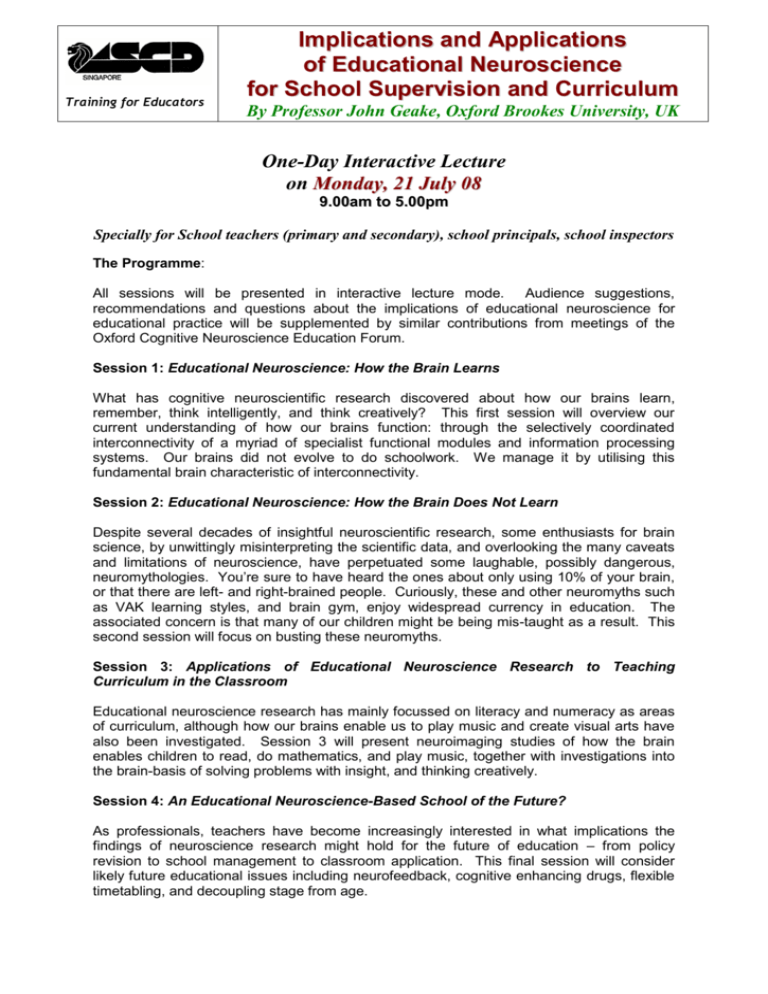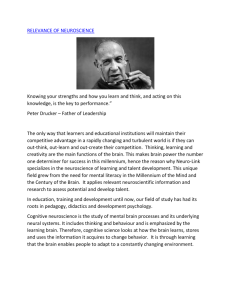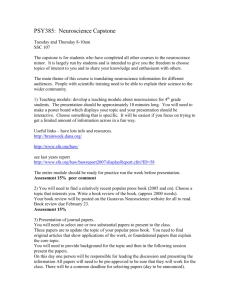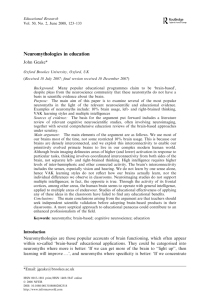Implications and Applications of Educational Neuroscience for
advertisement

Training for Educators Implications and Applications of Educational Neuroscience for School Supervision and Curriculum By Professor John Geake, Oxford Brookes University, UK One-Day Interactive Lecture on Monday, 21 July 08 9.00am to 5.00pm Specially for School teachers (primary and secondary), school principals, school inspectors The Programme: All sessions will be presented in interactive lecture mode. Audience suggestions, recommendations and questions about the implications of educational neuroscience for educational practice will be supplemented by similar contributions from meetings of the Oxford Cognitive Neuroscience Education Forum. Session 1: Educational Neuroscience: How the Brain Learns What has cognitive neuroscientific research discovered about how our brains learn, remember, think intelligently, and think creatively? This first session will overview our current understanding of how our brains function: through the selectively coordinated interconnectivity of a myriad of specialist functional modules and information processing systems. Our brains did not evolve to do schoolwork. We manage it by utilising this fundamental brain characteristic of interconnectivity. Session 2: Educational Neuroscience: How the Brain Does Not Learn Despite several decades of insightful neuroscientific research, some enthusiasts for brain science, by unwittingly misinterpreting the scientific data, and overlooking the many caveats and limitations of neuroscience, have perpetuated some laughable, possibly dangerous, neuromythologies. You’re sure to have heard the ones about only using 10% of your brain, or that there are left- and right-brained people. Curiously, these and other neuromyths such as VAK learning styles, and brain gym, enjoy widespread currency in education. The associated concern is that many of our children might be being mis-taught as a result. This second session will focus on busting these neuromyths. Session 3: Applications of Educational Neuroscience Research to Teaching Curriculum in the Classroom Educational neuroscience research has mainly focussed on literacy and numeracy as areas of curriculum, although how our brains enable us to play music and create visual arts have also been investigated. Session 3 will present neuroimaging studies of how the brain enables children to read, do mathematics, and play music, together with investigations into the brain-basis of solving problems with insight, and thinking creatively. Session 4: An Educational Neuroscience-Based School of the Future? As professionals, teachers have become increasingly interested in what implications the findings of neuroscience research might hold for the future of education – from policy revision to school management to classroom application. This final session will consider likely future educational issues including neurofeedback, cognitive enhancing drugs, flexible timetabling, and decoupling stage from age. John Geake A former secondary school science and music teacher, and primary school head teacher in Australia, Dr John Geake is Professor of Education, Westminster Institute, Oxford Brookes University, where his research interests focus on gifted education and educational neuroscience. He is also a member of the Centre for Cognitive Neuroscience, University of Oxford, where he conducts neuroimaging studies into creative intelligence. In 2001 Professor Geake co-founded the Oxford Cognitive Neuroscience Education Forum. Currently he is an advisor to the House of Lords All Party Parliamentary Group on Science Research in Learning and Education, and a consultant on educational neuroscience to the United States National Science Foundation Science of Learning Centres Program. Professor Geake was a Lead Speaker at the opening day of the international conference of the World Council for Gifted and Talented Children, University of Warwick, August 2007, and will be presenting a keynote address to the 10th Asia-Pacific Conference of Gifted Education, Singapore, 14-18th July, 2008. VENUE: The Grassroots Club 190 Ang Mo Kio Ave 8 Singapore 568046 WORKSHOP FEES: Fee Per Participant Membership Status ASCD Singapore Life or Ordinary Member ASCD Singapore Institute Member (Groups of 3 participants) Non-Member (Fee includes ASCD Ordinary Membership until 31 Dec 09) S$185 each S$525 for group of 3 S$235 each Limited to 50 participants Participants will receive training materials. Morning and Afternoon Tea and Lunch refreshments will be provided. CLOSING DATE FOR REGISTRATION Closing date for all registrations is 11 July 2008 or as soon as the workshop is full. Call 96816704 for any enquiries.





